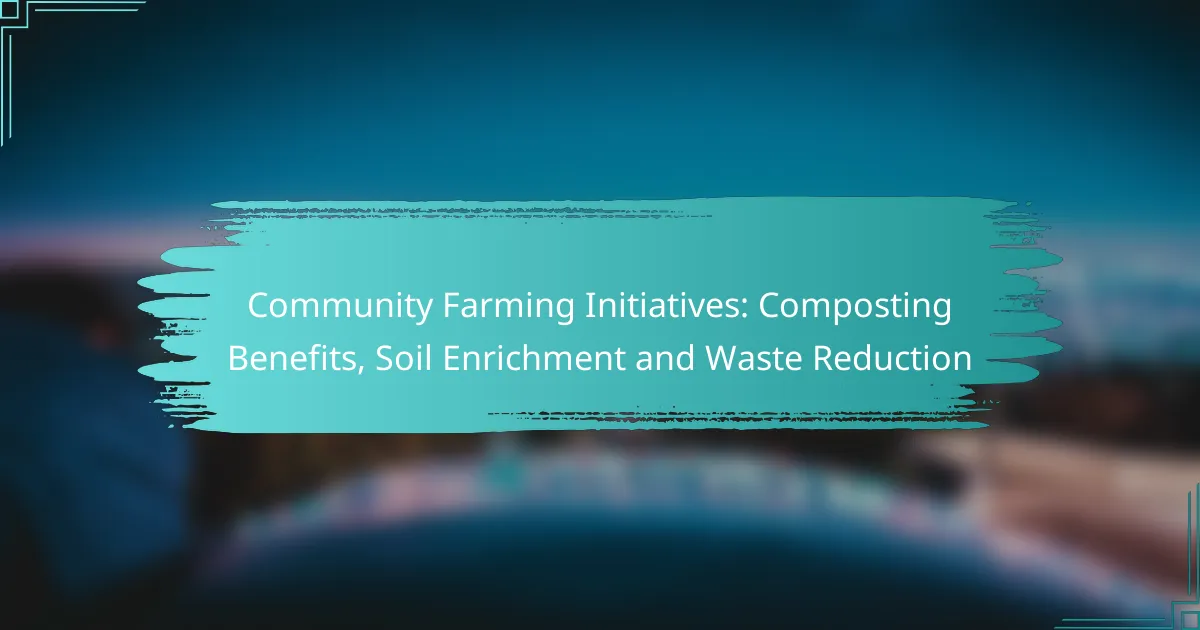Community farming initiatives are vital in promoting composting as a sustainable practice in urban areas, engaging residents and providing essential resources. By educating the community on the benefits of composting, these programs enhance soil health and contribute to waste reduction, ultimately fostering a more sustainable food system and a healthier environment.
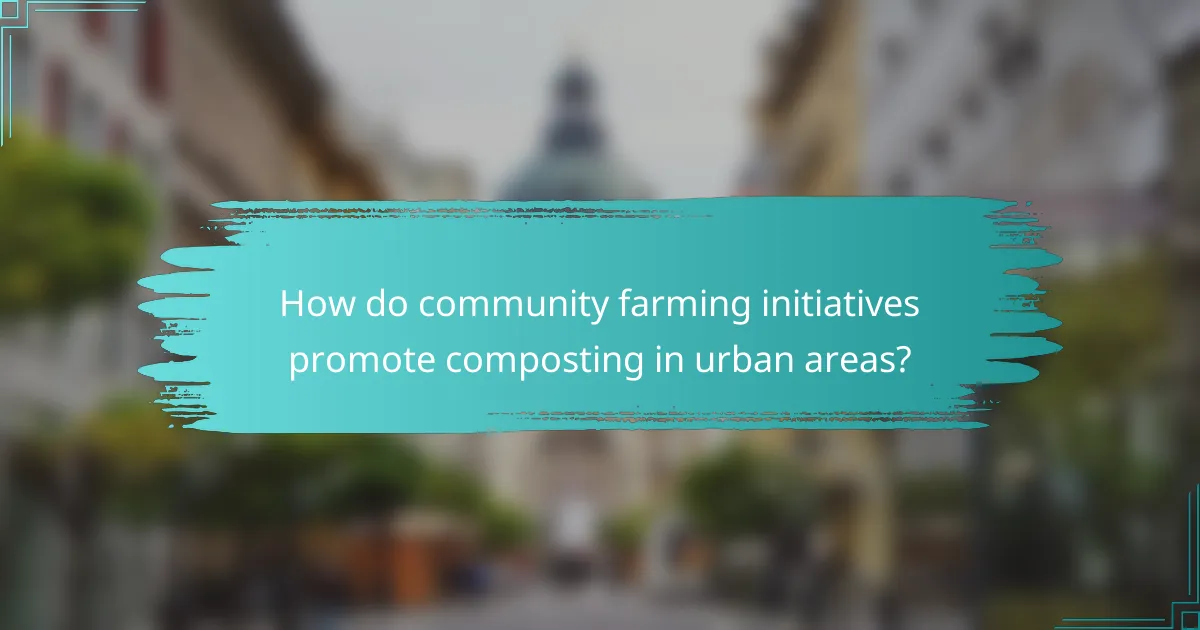
How do community farming initiatives promote composting in urban areas?
Community farming initiatives enhance composting in urban settings by fostering local engagement and providing resources that make composting accessible. These programs educate residents on the environmental and practical advantages of composting, thereby encouraging sustainable waste management practices.
Increased awareness of composting benefits
Community farming initiatives raise awareness about the benefits of composting, such as reducing landfill waste, enriching soil, and promoting healthier plant growth. By highlighting these advantages, urban residents become more motivated to adopt composting practices in their households and gardens.
Educational campaigns often emphasize that composting can significantly decrease the volume of organic waste sent to landfills, which in turn reduces greenhouse gas emissions. This information resonates particularly well in urban areas where waste management is a pressing issue.
Community workshops and training sessions
Workshops and training sessions organized by community farming initiatives provide hands-on experience in composting techniques. These events teach participants how to create compost bins, what materials to include, and how to maintain their compost effectively.
Typically, these sessions can accommodate various skill levels, from beginners to those looking to refine their composting methods. Participants often leave with practical tools and knowledge that empower them to implement composting in their own homes.
Partnerships with local governments
Community farming initiatives often partner with local governments to enhance composting efforts. These partnerships can lead to the establishment of city-wide composting programs, providing residents with access to compost bins and collection services.
Such collaborations may also result in funding for educational resources and infrastructure improvements, making composting more feasible for urban dwellers. By aligning with local regulations and sustainability goals, these initiatives can effectively promote composting as a viable solution for waste reduction in cities.
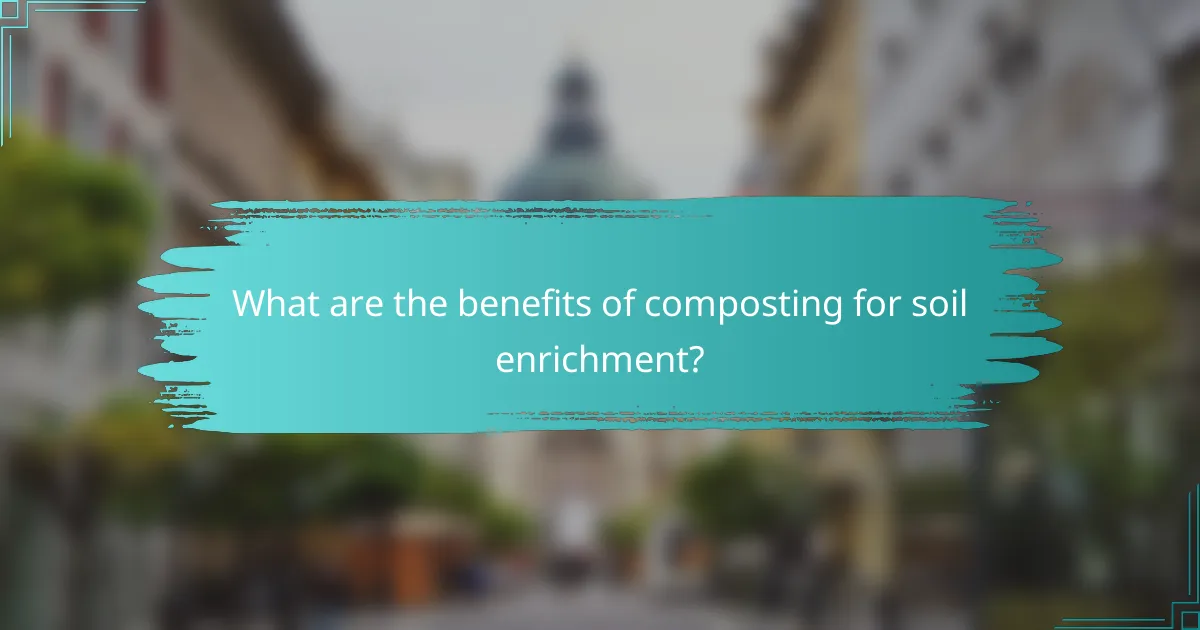
What are the benefits of composting for soil enrichment?
Composting significantly enhances soil enrichment by improving its structure, fertility, and overall health. This process transforms organic waste into nutrient-rich compost, which can be directly applied to gardens and farms, promoting sustainable agricultural practices.
Improved soil structure and fertility
Composting improves soil structure by increasing its organic matter content, which enhances aeration and water retention. Healthy soil structure allows roots to penetrate more easily, leading to better plant growth and resilience against drought.
Additionally, compost provides essential nutrients like nitrogen, phosphorus, and potassium, which are vital for plant health. Using compost can lead to a noticeable increase in crop yields, making it a valuable resource for community farming initiatives.
Enhanced microbial activity
The introduction of compost into soil boosts microbial activity, which is crucial for nutrient cycling. Beneficial microorganisms break down organic materials, releasing nutrients in forms that plants can readily absorb.
Higher microbial diversity also helps suppress soil-borne diseases and pests, reducing the need for chemical interventions. This natural balance fosters a healthier ecosystem, which is particularly beneficial for organic farming practices.
Reduction of chemical fertilizer use
By enriching soil with compost, farmers can significantly reduce their reliance on chemical fertilizers. Compost provides a slow-release source of nutrients, which can sustain plant growth over longer periods without the risk of nutrient leaching.
Transitioning to compost can lead to cost savings for farmers, as organic amendments are often less expensive than synthetic fertilizers. Moreover, this shift supports environmental sustainability by minimizing chemical runoff into local waterways.
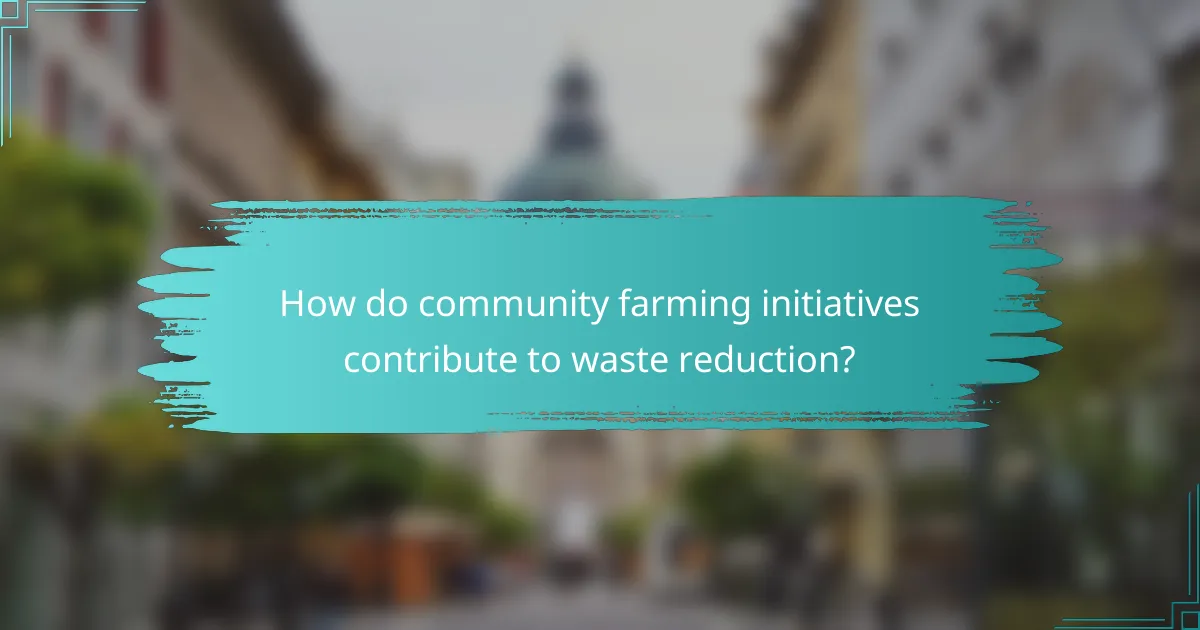
How do community farming initiatives contribute to waste reduction?
Community farming initiatives play a crucial role in waste reduction by promoting practices that minimize organic waste and encourage sustainable food systems. These initiatives help divert waste from landfills, create a circular economy, and support local food production, all of which contribute to a healthier environment.
Diverting organic waste from landfills
Community farms often implement composting programs that transform organic waste into valuable compost, reducing the amount sent to landfills. By collecting food scraps, yard waste, and other biodegradable materials, these farms can significantly decrease landfill contributions, which helps lower greenhouse gas emissions.
In many regions, local governments may offer incentives for composting, such as reduced waste disposal fees or free compost bins. Engaging the community in these efforts not only educates residents about waste management but also fosters a sense of shared responsibility.
Creating a circular economy
Community farming initiatives contribute to a circular economy by reusing resources and minimizing waste. This approach emphasizes the importance of recycling nutrients back into the soil through composting, which enhances soil health and promotes sustainable agricultural practices.
By closing the loop on food production and waste, these farms can create a self-sustaining system where organic materials are continuously cycled. This not only reduces reliance on external inputs but also encourages local economic growth by keeping resources within the community.
Encouraging local food production
By focusing on local food production, community farming initiatives help reduce the carbon footprint associated with transporting food over long distances. This localized approach not only minimizes waste but also supports the consumption of fresh, seasonal produce.
Community farms often provide educational programs that teach residents about sustainable farming practices and the benefits of eating locally. This can lead to increased demand for local produce, further supporting the community’s economy and reducing food waste associated with spoilage during transport.

What criteria should be considered when starting a community composting program?
When starting a community composting program, it’s essential to consider factors such as location, community involvement, and regulatory requirements. Each of these elements plays a crucial role in the program’s success and sustainability.
Location and space availability
Choosing the right location for a community composting program is vital. Look for areas that are easily accessible to community members and have enough space to accommodate compost bins or piles without causing disruption. Ideally, a space of at least 100 square feet is recommended to allow for proper composting activities.
Consider proximity to local gardens or farms, as this can facilitate the use of composted material. Avoid placing compost sites near residential areas to minimize odor and pest issues.
Community engagement and support
Engaging the community is critical for the success of a composting program. Start by organizing informational meetings to educate residents about the benefits of composting and how they can participate. Building a strong support network can help ensure ongoing participation and enthusiasm.
Encourage volunteers to take part in the composting process, from collecting organic waste to turning the compost. Establishing a regular schedule for community involvement can foster a sense of ownership and responsibility.
Regulatory compliance and permits
Before launching a community composting program, check local regulations regarding composting practices. Some areas may require permits or have specific guidelines on composting materials and methods. Familiarize yourself with these regulations to avoid potential fines or shutdowns.
Consult local waste management authorities for advice on compliance and best practices. They may provide resources or assistance in setting up the program in accordance with local laws.
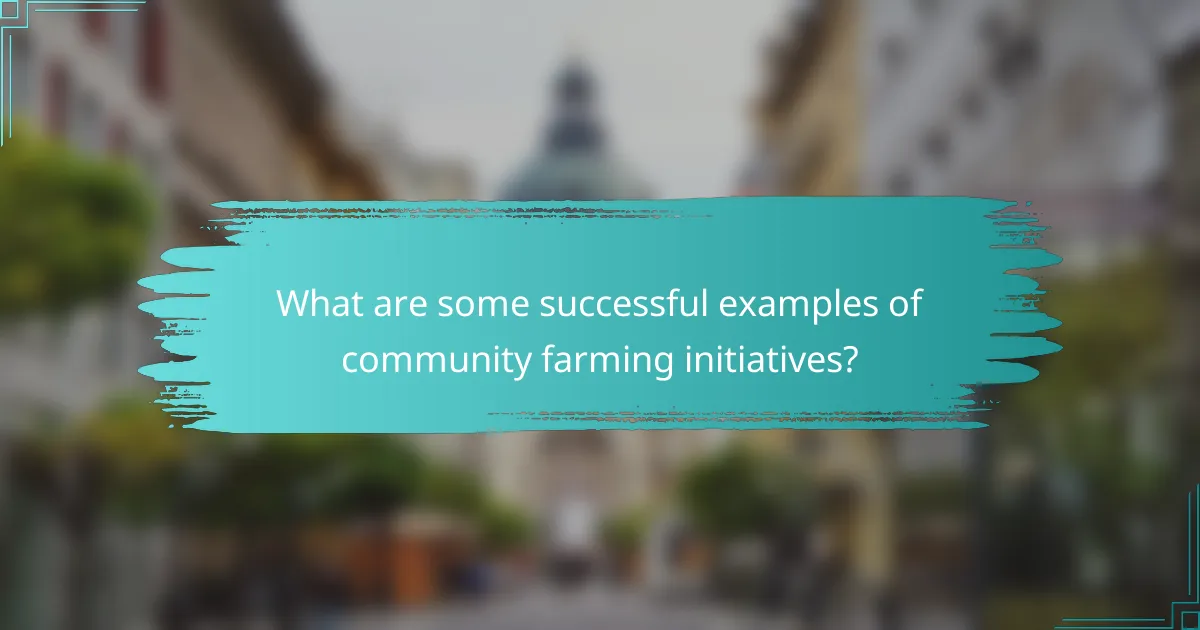
What are some successful examples of community farming initiatives?
Successful community farming initiatives often focus on local engagement, sustainability, and education. These projects not only enhance food security but also foster community ties and promote environmental stewardship.
Brooklyn Grange in New York City
Brooklyn Grange operates rooftop farms across New York City, transforming underutilized spaces into productive agricultural sites. They grow a variety of vegetables and herbs, focusing on organic practices to enrich urban soil and promote biodiversity.
The initiative also emphasizes community involvement through workshops and volunteer opportunities, allowing residents to learn about sustainable farming and composting. This hands-on approach helps reduce food waste and encourages local consumption.
Urban Roots in Austin
Urban Roots is dedicated to empowering young people through food and farming in Austin, Texas. Their programs teach participants about sustainable agriculture, nutrition, and entrepreneurship, while cultivating fresh produce for local communities.
By integrating composting and soil enrichment techniques, Urban Roots enhances the health of their urban plots. They also distribute food to local food banks, addressing food insecurity while promoting environmental awareness.
City Farm in Chicago
City Farm is an urban agriculture project in Chicago that focuses on organic farming practices and community education. They grow a diverse range of crops, which are sold at local farmers’ markets, providing fresh produce to city residents.
City Farm also engages the community through workshops on composting and soil health, encouraging sustainable practices among urban dwellers. Their efforts contribute to waste reduction by promoting composting as a means of enriching soil and supporting local ecosystems.
